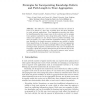Free Online Productivity Tools
i2Speak
i2Symbol
i2OCR
iTex2Img
iWeb2Print
iWeb2Shot
i2Type
iPdf2Split
iPdf2Merge
i2Bopomofo
i2Arabic
i2Style
i2Image
i2PDF
iLatex2Rtf
Sci2ools
IEAAIE
2010
Springer
2010
Springer
Strategies for Incorporating Knowledge Defects and Path Length in Trust Aggregation
The ability for a user to accurately estimate the amount of trust to be placed in a peer user is gaining more and more attention in social network applications. Trust aggregation provides this ability by identifying paths that connect users in the network, and by merging trust opinions expressed by users along these paths. However, as individual trust opinions are not always based on perfect knowledge, and since the quality of a trust estimation propagated along a given path may diminish as its length increases, mechanisms are needed to handle these imperfections. In this paper, we propose a set of trust aggregation operators that take into account knowledge defects and path length. We investigate their properties, and discuss how they may be implemented in practice, taking into account characteristics of the network such as the availability of a central authority, or the need to preserve users' privacy by not publically disclosing their trust information.
| Added | 13 Feb 2011 |
| Updated | 13 Feb 2011 |
| Type | Journal |
| Year | 2010 |
| Where | IEAAIE |
| Authors | Nele Verbiest, Chris Cornelis, Patricia Victor, Enrique Herrera-Viedma |
Comments (0)

